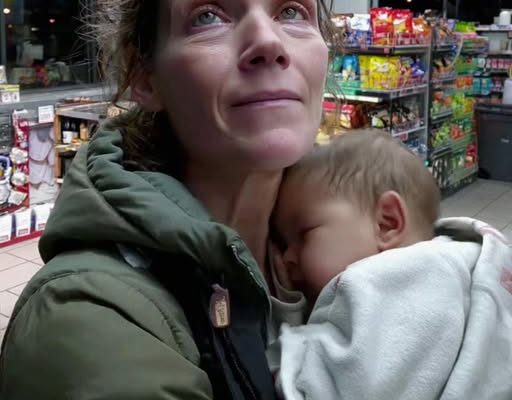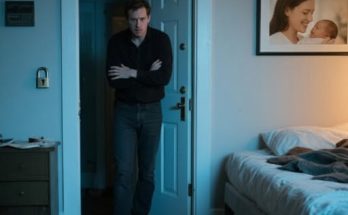I never used to believe small moments could change the course of your life. You work, you come home, you do what you can with what you’ve got. The world rarely hands out surprises, and when it does, they usually aren’t the good kind. But one quiet Thursday morning at the gas station proved me wrong.
My name’s Ross. I’m 49, married to Lydia, and raising two kids who seem to outgrow everything but their appetite. We’ve got a mortgage that’s too big for a house that’s too small, but after everything that’s happened, I’m grateful we have it at all.
A few years ago, the factory I’d worked at for twenty-three years shut down with all the compassion of a falling brick. One day we walked in for our shift like always. By afternoon, we were locked out with a bankruptcy notice taped to the fence. No warning. No meeting. Just a paper flapping in the wind telling us our livelihoods were gone.
I was in my mid-forties then—too old to be considered “fresh talent,” too young to retire, and too proud to sit around doing nothing. I hunted for work anyway. Applications, interviews, endless calls. The younger guys got jobs while I got polite rejections. Eventually, I swallowed my pride and took the night shift at a gas station off Highway 52. Not glamorous, but it paid enough to keep the lights on, and at that point, that was the bar.
Most nights at the station blur together. A few truckers, a couple teenagers with energy drinks, then long stretches of silence where the fluorescent lights buzz louder than the radio. That night felt like any other—until it didn’t.
It was nearly 11:30 p.m. when she came in.
She held a sleeping little boy against her shoulder—maybe two years old, maybe younger. His head rested on her neck, his tiny hand limp on her sweatshirt. She moved like a woman who’d been carrying the weight of the world long before she picked up that child. Her ponytail was messy, her clothes worn, and the exhaustion on her face was something I recognized instantly. I’d seen that same look in the mirror more times than I cared to admit.
She didn’t speak. Just walked slowly through the aisles, balancing the boy with one arm while picking up a carton of milk, a loaf of bread, and a small pack of diapers. Essentials. Nothing else.
When she reached the counter, she shifted the boy gently and set her items down like she was handling glass.
“Fourteen seventy-two,” I said.
She dug through her purse, her breathing getting shallow the longer she searched. Crumpled bills, a few coins, a credit card she clearly didn’t trust. When she counted again, her shoulders sank.
“I’m… I’m short by four dollars,” she whispered. “Can I put the diapers back?”
Her voice cracked at that last word.
I didn’t think about policy or rules or consequences. I just reached into my wallet, pulled out four singles, and slipped them into the register.
“It’s covered,” I said quietly. “Get home safe.”
She looked at me like the offer hurt more than the struggle. Gratitude does that sometimes. She nodded, grabbed the bag, and hurried out into the cold. Through the window, I watched her press a kiss into the boy’s hair before getting into a beat-up sedan and driving off into the dark.
I didn’t think about her much after that. In this job, people pass through like ghosts—there for a moment, then gone without a trace.
But exactly one week later, something changed.
My manager, Mr. Jenkins, called me into his little office in the back. I figured I was getting a lecture about the register shorting four dollars. Instead, he held out a plain white envelope.
“This came for you,” he said. “Delivered this morning. No return address.”
My name was handwritten on the front. I opened it, expecting maybe a thank-you note. Instead, a check slipped into my hand.
Five thousand dollars.
I stared at it like it might vanish. Behind it was a short note written in careful script.
“Dear Ross,
Thank you for showing kindness to my daughter Emily last Friday. You helped her more than you could know. Because of you, she and our grandson made it home safely. This is a small thank-you. Please join us for lunch this Sunday. We would like to thank you in person.”
There was an address at the bottom—one from the nicer side of town.
I drove home with the envelope sitting in the passenger seat like it might explode at any moment. When I showed Lydia, she covered her mouth and immediately teared up.
“You helped someone without expecting anything,” she said quietly. “This is what it looks like when goodness finds its way back.”
That Sunday, I drove to the address.
The house was the kind with a big porch, spotless driveway, and shutters painted a color you only pick when you have the luxury of choosing things like aesthetics. An older couple waited for me outside. Robert and Margaret. They greeted me like an old friend.
Inside, the table was already set for lunch. Before the food was served, they told me their story.
Their daughter, Emily—the woman from the station—had spent the last two years trapped in a marriage that drained the life out of her. A husband who isolated her, belittled her, controlled everything from her money to her freedom. She’d finally built the courage to leave. That night, she was driving cross-state with her son asleep in the back, terrified and nearly out of options. She hadn’t eaten. She was running low on gas. She had no idea if she was making the right choice or heading toward more disaster.
“She thought running short at the register was a sign she’d failed already,” Margaret said, voice trembling. “But you—your kindness—gave her hope instead of shame.”
“When she got here,” Robert added, “she told us about you. She called you ‘the man who didn’t make me feel broken.’ We wanted to thank you properly.”
I told them I didn’t need money. I told them four dollars wasn’t a heroic act.
They shook their heads.
“You didn’t give her four dollars,” Margaret said. “You gave her the courage to finish driving home.”
We talked for hours. About life, hardship, second chances. Before I left, Margaret hugged me like a mother hugging a son she thought she’d lost.
On the drive home, I realized something: I’d spent years feeling invisible, like the world had moved on without me after the factory shut down. But that moment in the gas station mattered. Not because of the money. Because it proved I still had something to offer the world.
I deposited the check two days later. It kept us afloat longer than I expected. But what stayed with me wasn’t the money. It was the reminder that small kindness, the kind that comes without hesitation, carries more weight than you think.
I still work the night shift. The lights still buzz. The hot dogs still burn on the roller.
But now, when someone walks in looking like life has chewed them up, I pay attention. Because four dollars didn’t change my life.
What it returned to me did.



